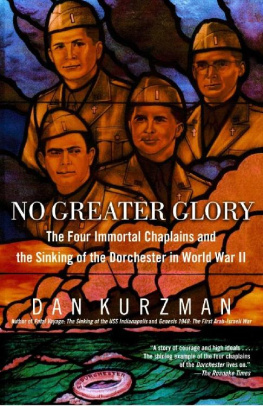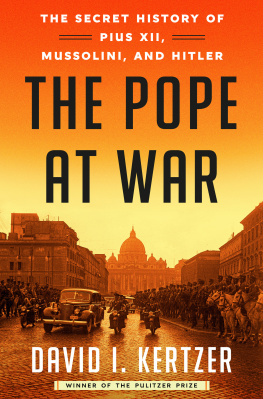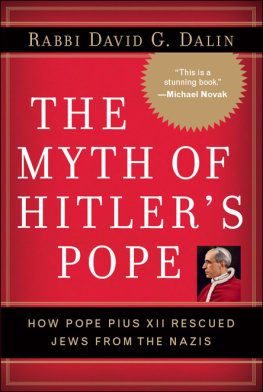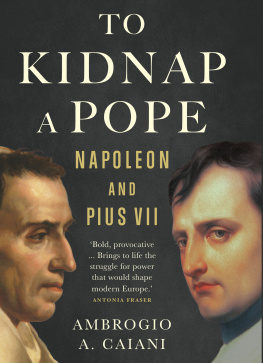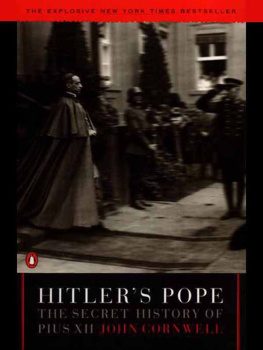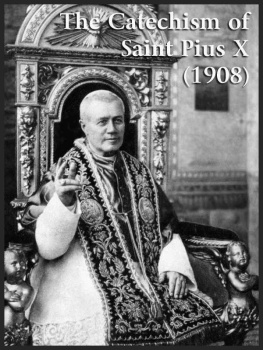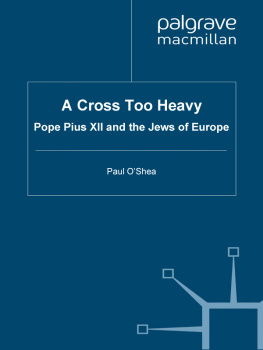Preface
Adolf Hitlers plot to kidnap and perhaps kill Pope Pius XII and loot the Vatican after Italian dictator Benito Mussolini was ousted from power was a most important and intriguing episode of World War II. Yet, it has been barely mentioned in even the most comprehensive history books about the war. And what has been reported is treated as inconsequential rumor.
The plot, however, was real indeed, and all the more consequential because it was linked to a Nazi threat intended to keep Pius publicly silent when a planned roundup of the Jews of Rome occurred. Whatever he might have done without such pressure, German officials in Rome opposed to the kidnap plot warned that he had a choice: seal either his lips or his fate.
No official German documents referring to the plot apparently exist, since Hitler forbade any reference to it in writing, keeping it as secret as his plan for Jewish genocide. But my interviews with the Nazi general ordered to plan the plot, other involved Germans, and knowledgeable Vatican officials leave little doubt that the plot was serious with ramifications that wove through a critical segment of history like a red thread.
Though it was never implemented, awareness of it helped not only to determine what happened to the Roman Jews, whose ancestry in the Eternal City dated back to the time of Caesar, but to mold the policies and behavior of the pope, Hitler, and their subordinates in the months after Mussolinis overthrow in July 1943.
Pius and Hitler loathed each other. The pope, who, for his part, had been involved in a plot to oust or kill the Fhrer a few years earlier, feared that he intended to destroy the Church. And the Fhrer, viewing the pope as a potential rival in a postwar struggle for control of the minds and souls of much of mankind, feared that he might speak out publicly against the Jewish genocide, especially if it took place right under his window and turned Catholics against him, including those in the German army.
The coup against Mussolini brought to a head this bitter mutual hostility, with Hitler ordering his troops into Rome, where they would be in a position to carry out the plot against Pius. But some German officers and diplomats who felt a papal abduction would be ruinous to Germany, saw a window of salvation if the pope could be persuaded not to publicly protest the deportation of his Jewish neighbors. Perhaps then Hitler would cancel the kidnap plan.
Ironically, the man leading the conspiracy to save the pope, as well as the Jews, had been chosen by Hitler to prepare the abduction plot. He was SS General Karl Wolff, a little-known but powerful behind-the-scenes Nazi leader who became SS commander in Italy after having been chief of staff to Heinrich Himmler, orchestrator of the Holocaust, and then liaison between Himmler and Hitler.
But for his own reasons, Wolff, who once had to make sure that boxcars crammed with Jews reached the death camps on time, would now help to save, not only the pope, but most of the Roman Jews in an extraordinary confluence of events. Wolffs opportunistic talent was formidable. He would enjoy, simultaneously, the complete confidence of both the Vicar of Christ and the Antichrist.
I interviewed General Wolff for many hours after his release from a war criminals cell about his role in the kidnap plot, which he claimed to have helped foil. Wolff was not always truthful; he surely lied when he said he had been kept in the dark about the mass killing of Jews, knowing that a confession of his role in that crime would doom him to the gallows if the Allies won the war.
But other key persons involved in the effort to thwart the kidnap plot offered me details that clearly support Wolffs account. They include Rudolph Rahn, German ambassador to Mussolinis rump state established in northern Italy after the Duces ouster from Rome; Eitel Mllhausen, Rahns deputy in the Italian capital; Albrecht von Kessel, deputy to Ernst von Weizscker, German ambassador to the Vatican; and SS Colonel Eugen Dollman, Wolffs liaison with Field Marshal Albert Kesselring, the supreme military commander in Italy.
Moreover, Father Peter Gumpel, who, as the Vaticans chief investigator of Piuss career to determine if he should be beatified, had unlimited access to documents and oral testimony, told me that the evidence showed Wolff had played the role he claimed to have performed. I gleaned information from hundreds of others who had participated in the drama or had relevant information. And I gathered material as well at archives in Rome, Washington, London, Berlin, Munich, and other German towns.



